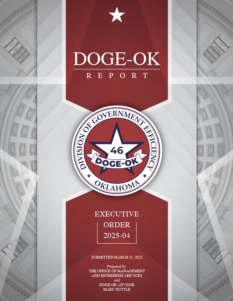 Governor Kevin Stitt’s DOGE-OK team has released its first report and has identified $157 million in federal health grants that are duplicative, underutilized, or exceeding the actual need. The report also identifies a strategy to reduce the number of state employees, manage state property and office space, and establishing another way to identify purchases which should be reviewed.
Governor Kevin Stitt’s DOGE-OK team has released its first report and has identified $157 million in federal health grants that are duplicative, underutilized, or exceeding the actual need. The report also identifies a strategy to reduce the number of state employees, manage state property and office space, and establishing another way to identify purchases which should be reviewed.
“Oklahomans work hard for their money—DOGE-OK is making sure the government does the same,” said Stitt. “We all want Oklahoma to lead with common sense and make responsible choices that prioritize citizens over bureaucracy. Congressional Republicans have worked with DOGE on the federal level to make incredible progress, even as Democrats and the swamp attempt to block their efforts. I look forward to continuing our work to implement reforms to protect taxpayers.”
According to the DOGE-OK report, since Stitt took office in 2019 the number of state employees has marginally increased from 30,844 to 31,664. The next step is to analyze workload distribution, benchmarking staffing levels against similar agencies, and assessing cost-effectiveness. Stitt has said that he wants the State of Oklahoma to employ fewer workers by the time he leaves office than the level when he entered.
The report also outlined the next steps for property reviews now that a centralized database has been created for better management. Those steps will include a cost-benefit analysis to compare ownership versus leasing, prioritizing high-cost properties for consolidation, and strategically shifting agencies into shared facilities.
Within the Office of Management and Enterprise Services, DOGE-OK expanded on the Risk, Assessment and Compliance (RAC) division. DOGE-OK and OMES found $8.48 billion in statutory exempt purchases for review, $190 million in flagged purchase card transactions, and $3 billion in off-contract spending.
You can find the DOGE-OK report here.


